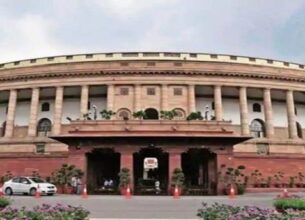Institutional Arbitration
15, Apr 2023

Prelims level : Governance
Mains level : GS-II Governance | Gov Schemes
Why in News?
- Institutional arbitration in India refers to the use of specialised institutions to administer the arbitration process between two or more parties.
- These institutions provide a framework for the conduct of arbitration proceedings and offer a range of services, including appointing arbitrators, managing the process, and enforcing awards.
- India has acquired a reputation of being ‘arbitration-unfriendly’, for several reasons — lack of preference for institutional arbitration over ad hoc arbitration, frequent interference from the judiciary from the appointment of arbitrators to the enforcement of awards, and setting aside of arbitral awards on grounds of ‘public policy’.
- India is ranked 163rd, in ‘Enforcing Contracts’ in the World Bank’s Ease of Doing Business report. The report says it takes almost four years and 31% of the cost of the claim to enforce a contract in India.
- The use of institutional arbitration in India has gained significant momentum in recent years due to various reasons, including the rise of foreign investment in India and the need for a more efficient and reliable dispute resolution mechanism.
- Yet, India is not a preferred arbitration destination, even for disputes between Indian businesses.
- Singapore has emerged as a global arbitration hub and is ranked first in terms of ‘Enforcing Contracts’. Indian companies are among its top users.
Online Dispute Resolution (ODR):
- Online dispute resolution (ODR) in India refers to the use of technology to facilitate the resolution of disputes between parties.
- The primary legislation governing Online Dispute Resolution in India is the Information Technology Act, 2000.
- Section 89 of the Code of Civil Procedure, 1908, also provides for the use of alternative dispute resolution mechanisms, including ODR, to resolve disputes.
- The widespread adoption of online technology during the COVID-19 pandemic, which was led by the judiciary through online hearings, has provided India with an opportunity to capitalise on its technological strengths and become a leading player in online dispute resolution (ODR).
- The Indian government has been actively promoting ODR as a means to increase access to justice, particularly for those who live in remote or rural areas.
Advantages of ODR:
- The government has launched a number of initiatives to promote ODR in India. For example, the Ministry of Electronics and Information Technology (MeitY) has launched the Online Dispute Resolution (ODR) platform to provide an online platform for the resolution of disputes.
- It encompasses the integration of tools such as multi-channel communication, case management systems, automated case flows, digital signatures and stamping, and even the application of advanced technologies such as blockchain, natural language processing, artificial intelligence, and machine learning.
- The ODR platform provides a secure, easy-to-use platform for the resolution of disputes between parties. Parties can submit their dispute online and the platform facilitates the resolution of the dispute through mediation or arbitration.
- It can reduce the burden on the courts, save time and costs, and provide effective resolutions.
- The ODR platform is particularly useful for small disputes, such as those involving consumer complaints or disputes between small businesses.
- It is also useful for disputes that involve parties who are located in different parts of the country.
Way Forward:
- Overall, the use of ODR in India is still in its early stages, but it is expected to grow in popularity as more people become aware of its benefits.
- Collaboration among the legislative, executive, and judicial branches is crucial to promote the widespread adoption of ODR in India.
- Some institutions such as the Reserve Bank of India, the National Payments Corporation of India, and the Open Network for Digital Commerce have already taken the lead by integrating ODR mechanisms into their initiatives.
- However, it is necessary to extend these efforts to a broader audience to achieve mass adoption of ODR in India.
- The government can collaborate with the private sector to develop and promote ODR platforms. Private companies can invest in the development of ODR technology and platforms, and the government can provide incentives and support to encourage such investment.
- The use of ODR could be incentivised through legislative measures, such as establishing ODR as the default dispute resolution mechanism for specific categories of disputes that arise from online transactions.
- Government must work on solving infrastructural challenges, curb the digital divide, and catalyse ODR’s growth by optimising existing setups such as Aadhaar kendras to also function as ODR kiosks.
- On the lines of the Finance Minister allocating ₹7,000 crore for the third phase of the e-Courts project in the Union Budget 2023 , a dedicated fund must be set up for furthering ODR.
- The use of ODR platforms should be accompanied by strong data protection measures to ensure the confidentiality and privacy of the parties involved.
- The government should develop guidelines and regulations to ensure that ODR platforms are secure and comply with data protection laws.
















